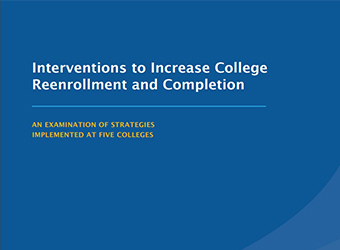 Colleges and universities employ a variety of methods to bring former students back to complete their credential, but which of these strategies shows the greatest results?
Colleges and universities employ a variety of methods to bring former students back to complete their credential, but which of these strategies shows the greatest results?
That’s precisely what Paul Perrault, Vice President of Research and Evaluation with Helios Education Foundation and Justin Ortagus, Ph.D., Assistant Professor, Higher Education Administration & Policy, University of Florida sought to answer. Helios partnered with the University of Florida’s Institute of Higher Education to better understand the effectiveness of low-cost reenrollment interventions.
Perrault and Ortagus shared some of the study’s findings during a February 26 webinar hosted by Kathy McDonald, FCAN’s Assistant Director for Network Partnerships.
Students Stopping Out of College
Over a third of students who enroll in college do not complete a credential within 6 years. Some stop out all together for a variety of reasons, intending to come back, though most never do.
Perrault noted that of the nearly 11.6 million U.S. jobs added since the recession, the overwhelming majority went to those with at least some college education. More than 8.4 million of those jobs (72%) went to workers with a bachelor’s degree of higher.
That’s why it was imperative, Perrault and Ortagus said, to focus on Florida students who had earned some college credit, identify why they stopped out, and create the most impactful supports to help them complete their degree.
Designing the Study
The study examined approaches across five high-enrollment Florida colleges. Students who met the requirements — including 30 credit hours accrued, a 2.0 GPA or better, and three years or less since they stopped out — were randomly assigned to one of three groups:
- Control: Students were given no additional information or support
- Information-only: Students received 10 text nudges encouraging them to re-enroll in college and visit a custom website that simplified and streamlined the reenrollment process
- Information + financial incentive: Students received the informational nudges as well as a one-course tuition waiver
Of the 27,028 students participating in the study, 2,099 reenrolled. While the information-only treatment did not have a statistically significant effect on re-enrollment, students who received the information nudge and the one-course tuition waiver were 21% more likely to reenroll.
Recommendations and Next Steps
The study also included a follow-up survey and one-on-one interviews to better understand why students stopped out, and three themes emerged:
- Financial struggles and the need to work
- Challenges with advising and course scheduling
- Unexpected life circumstances
Among the study’s recommendations to help students overcome those potential barriers:
- Offer tuition assistance in the form of a one-course waiver to encourage students to reenroll
- Increase online opportunities for required coursework
- Provide referral services and wrap-around support for non-academic challenges
- Increase funding for more advising resources
- Increase access to emergency scholarships
Show Notes
To learn more about the most effective reenrollment strategies — or to view the webinar and download the presentation — take advantage of these resources:
Recording
Slides
Study — Interventions to Increase College Reenrollment and Completion
Be sure to visit our Past Webinars page for access to recordings and downloadable material from FCAN’s previous presentations.
